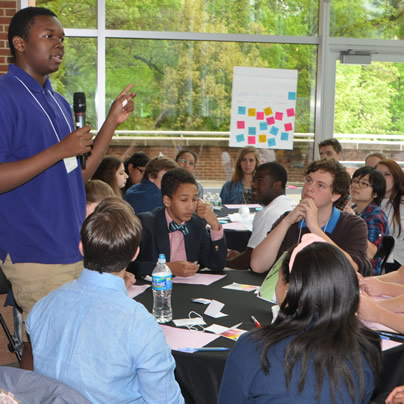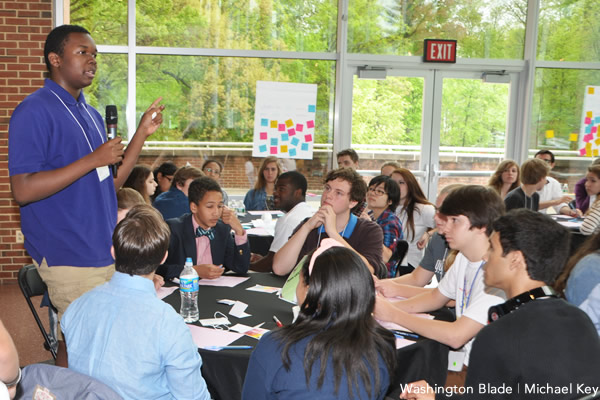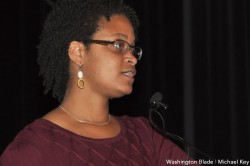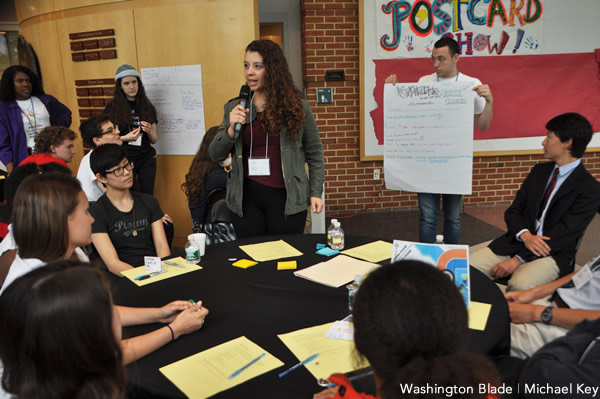Local
Gay-Straight Alliance summit draws 130 students
Potomac event is first-of-its-kind in D.C. area


The Bullis School in Potomac hosted the first annual GSA Student Summit this week. (Washington Blade photo by Michael Key)
At least 130 students from 17 independent, private high schools and middle schools in the D.C. metro area met on Tuesday morning in what was billed as the region’s first annual Gay-Straight Alliance (GSA) Student Summit.
The event took place on the campus of the Bullis School in Potomac, Md., whose GSA group organized and hosted the gathering, according Bullis students and administrators.
“We just started the GSA this year, so I’m really proud of everybody who has been involved with this,” said Bullis 10th grader Sarah Holliday, who helped organize the summit.
“And seeing everybody come out here today is really heart-warming – that everybody still cares about this and wants to make a difference,” she said.
The New York-based Gay, Lesbian & Straight Education Network (GLSEN), which keeps track of and provides assistance to GSAs throughout the country, says 4,000 such groups have registered with GLSEN.
“Gay-Straight Alliances are student clubs that work to improve school climate for all students, regardless of sexual orientation or gender identity/expression,” a statement on the GLSEN website says.
“Found in all 50 states, the District of Columbia, Puerto Rico and U.S. military bases, GSAs have become one of the fastest-growing student clubs in the country,” the GLSEN statement says.
Among the schools represented by GSA members at Monday’s summit were Sidwell Friends School, Georgetown Day School, St. Albans School, National Cathedral School, and Edmund Burke School – all in D.C.
Others included Potomac School in McLean; St. Stephens and St. Agnes Schools in Alexandria; Landon School in Bethesda; and Connelly School of the Holy Child in Potomac.
The summit began with a plenary session in which Bullis Head of School Gerald Boarman welcomed both student participants and teachers and counselors that accompanied the students from their respective schools.
“It’s very important and apropos that at Bullis, where we are open in every way, embracing every individual who crosses through the hallways, that we’re hosting this event,” Boarman said.
“You are the participators,” he said. “You are the game changers. And I’m hoping you’ll take that not only as your mission but continue to do it throughout your years, not only in high school but in life.”

Tonia Poteat (Washington Blade photo by Michael Key)
Tonia Poteat, an assistant professor at Johns Hopkins University’s Bloomberg School of Public Health and an out lesbian, delivered the keynote speech at the summit.
Poteat, who holds a Ph.D. in public health, told of her involvement in AIDS prevention and education programs in Africa and of her work on behalf of LGBT rights causes in the U.S.
“We must challenge what is and think about what must be so that we can look at the social forces that created inequality and make a difference in them,” she said.
Following the plenary session the students met among themselves in two separate workshop sessions in which groups of about a dozen sat at conference tables to share ideas about operating GSAs.
Teachers, school counselors and administrators conferred separately at two conference tables to share their experiences in facilitating GSA groups at their respective schools.
Cathy Chu, youth leadership manager for SMYAL, the D.C.-based LGBT youth advocacy and service group, attended the summit as an observer. She told the gathering about SMYAL’s new initiative to help coordinate GSAs in the D.C. area.
SMYAL Executive Director Andrew Barnett said SMYAL is aware of about 77 GSAs in public schools in the D.C. metro area.
In interviews at the conclusion of the summit, nearly all of the students who spoke with the Blade said their respective schools were generally supportive of the school’s GSA.
Several of the students said their schools welcomed the annual GSA-initiated “Day of Silence” in which LGBT students and their straight allies remain silent in school and in all classes. The silence is intended to draw attention to anti-LGBT bullying and violence, which organizers say has had devastating effects on those targeted for such behavior.
“I think Bullis is a great GSA environment,” said Sean Watkinson, a Bullis senior. “The GSA has a huge impact on the school. We do a lot with the Day of Silence and there is just a lot of talk about it and we have a lot of support from the school as a whole.”
Some of the students said members of their school GSAs or other similar groups remain cautious about identifying themselves as gay.
Ian Dabney of Landon School of Bethesda said that school has a group called Ally Council, which has no “set member list” but tries to accomplish the same goals as a GSA.
“We don’t have meetings very often,” he said. “But we’re trying to get it going more often and get more people involved in it.”
Fellow Landon student Bobby Bolen, a freshman, said the Ally Council was intended to be “less structured than a GSA to make it less uncomfortable.”
Added Bolen, “You can go if you’re just an ally or if you’re gay – either one. It doesn’t make you choose. The term GSA makes some kids uncomfortable.”
When asked what the gay-straight breakdown was among GSA members at Bullis, junior Rayna Tyson said the group prefers not to press students into making those distinctions.
“No, especially when we have our meetings and we’re all getting together we don’t distinguish between who are the allies and like who is gay – like raise your hand if you’re gay?” she said.
“I think it is really about coming together and everyone being treated equally no matter what. We don’t have to put it out there,” she said. “It’s just great that people are here today who are gay, straight – it doesn’t matter. They are supportive and that’s what matters.”

(Washington Blade photo by Michael Key)
District of Columbia
D.C. police arrest man for burglary at gay bar Spark Social House
Suspect ID’d from images captured by Spark Social House security cameras

D.C. police on Feb. 18 arrested a 63-year-old man “of no fixed address” for allegedly stealing cash from the registers at the gay bar Spark Social House after unlawfully entering the bar at 2009 14th St., N.W., around 12:04 a.m. after it had closed for business, according to a police incident report.
“Later that day officers canvassing for the suspect located him nearby,” a separate police statement says. “63-year-old Tony Jones of no fixed address was arrested and charged with Burglary II,” the statement says.
The police incident report states that the bar’s owner, Nick Tsusaki, told police investigators that the bar’s security cameras captured the image of a man who has frequently visited the bar and was believed to be homeless.
“Once inside, the defendant was observed via the establishment’s security cameras opening the cash register, removing U.S. currency, and placing the currency into the left front pocket of his jacket,” the report says.
Tsusaki told the Washington Blade that he and Spark’s employees have allowed Jones to enter the bar many times since it opened last year to use the bathroom in a gesture of compassion knowing he was homeless. Tsusaki said he is not aware of Jones ever having purchased anything during his visits.
According to Tsusaki, Spark closed for business at around 10:30 p.m. on the night of the incident at which time an employee did not properly lock the front entrance door. He said no employees or customers were present when the security cameras show Jones entering Spark through the front door around 12:04 a.m.
Tsusaki said the security camera images show Jones had been inside Spark for about three hours on the night of the burglary and show him taking cash out of two cash registers. He took a total of $300, Tsusaki said.
When Tsusaki and Spark employees arrived at the bar later in the day and discovered the cash was missing from the registers they immediately called police, Tsusaki told the Blade. Knowing that Jones often hung out along the 2000 block of 14th Street where Spark is located, Tsusaki said he went outside to look for him and saw him across the street and pointed Jones out to police, who then placed him under arrest.
A police arrest affidavit filed in court states that at the time they arrested him police found the stolen cash inside the pocket of the jacket Jones was wearing. It says after taking him into police custody officers found a powdered substance in a Ziploc bag also in Jones’s possession that tested positive for cocaine, resulting in him being charged with cocaine possession in addition to the burglary charge.
D.C. Superior Court records show a judge ordered Jones held in preventive detention at a Feb. 19 presentment hearing. The judge then scheduled a preliminary hearing for the case on Feb. 20, the outcome of which couldn’t immediately be obtained.
District of Columbia
Judge rescinds order against activist in Capital Pride lawsuit
Darren Pasha accused of stalking organization staff, board members, volunteers

A D.C. Superior Court judge on Feb.18 agreed to rescind his earlier ruling declaring local gay activist Darren Pasha in default for failing to attend a virtual court hearing regarding an anti-stalking lawsuit brought against him by the Capital Pride Alliance, the group that organizes D.C.’s annual Pride events.
The Capital Pride lawsuit, initially filed on Oct. 27, 2025, accuses Pasha of engaging in a year-long “course of conduct” of “harassment, intimidation, threats, manipulation, and coercive behavior” targeting Capital Pride staff, board members, and volunteers.
In his own court filings without retaining an attorney, Pasha has strongly denied the stalking related allegations against him, saying “no credible or admissible evidence has been provided” to show he engaged in any wrongdoing.
Judge Robert D. Okum nevertheless on Feb. 6 approved a temporary stay-away order requiring Pasha to stay at least 100 feet away from Capital Pride’s staff, volunteers, and board members until the time of a follow-up court hearing scheduled for April 17. He reduced the stay-away distance from 200 yards as requested by Capital Pride.
In his two-page order issued on Feb. 18, Okun stated that Pasha explained that he was involved in a scooter accident in which he was injured and his phone was damaged, preventing him from joining the Feb. 6 court hearing.
“Therefore, the court finds there is a good cause for vacating the default,” Okun states in his order.
At the time he initially approved the default order at the Feb. 6 hearing that Pasha didn’t attend, Okun scheduled an April 17 ex parte proof hearing in which Capital Pride could have requested a ruling in its favor seeking a permanent anti-stalking order against Pasha.
In his Feb. 18 ruling rescinding the default order Okun changed the April 17 ex parte proof hearing to an initial scheduling conference hearing in which a decision on the outcome of the case is not likely to happen.
In addition, he agreed to consider Pasha’s call for a jury trial and gave Capital Pride 14 days to contest that request. The Capital Pride lawsuit initially called for a non-jury trial by judge.
One request by Pasha that Okum denied was a call for him to order Capital Pride to stop its staff or volunteers from posting information about the lawsuit on social media. Pasha has said the D.C.-based online blog called DC Homos, which Pasha claims is operated by someone associated with Capital Pride, has been posting articles portraying him in a negative light and subjecting him to highly negative publicity.
“The defendant has not set forth a sufficient basis for the court to restrict the plaintiff’s social media postings, and the court therefore will deny the defendant’s request in his social media praecipe,” Okun states in his order.
A praecipe is a formal written document requesting action by a court.
Pasha called the order a positive development in his favor. He said he plans to file another motion with more information about what he calls the unfair and defamatory reports about him related to the lawsuit by DC Homos, with a call for the judge to reverse his decision not to order Capital Pride to stop social media postings about the lawsuit.
Pasha points to a video interview on the LGBTQ Team Rayceen broadcast, a link to which he sent to the Washington Blade, in which DC Homos operator Jose Romero acknowledged his association with Capital Pride Alliance.
Capital Pride Executive Director Ryan Bos didn’t immediately respond to a message from the Blade asking whether Romero was a volunteer or employee with Capital Pride.
Pasha also said he believes the latest order has the effect of rescinding the temporary stay away order against him approved by Okun in his earlier ruling, even though Okun makes no mention of the stay away order in his latest ruling. Capital Pride attorney Nick Harrison told the Blade the stay away order “remains in full force and effect.”
Harrison said Capital Pride has no further comment on the lawsuit.
District of Columbia
Trans activists arrested outside HHS headquarters in D.C.
Protesters demonstrated directive against gender-affirming care

Authorities on Tuesday arrested 24 activists outside the U.S. Department of Health and Human Services headquarters in D.C.
The Gender Liberation Movement, a national organization that uses direct action, media engagement, and policy advocacy to defend bodily autonomy and self-determination, organized the protest in which more than 50 activists participated. Organizers said the action was a response to changes in federal policy mandated by Executive Order 14187, titled “Protecting Children from Chemical and Surgical Mutilation.”
The order directs federal agencies and programs to work toward “significantly limiting youth access to gender-affirming care nationwide,” according to KFF, a nonpartisan, nonprofit organization that provides independent, fact-based information on national health issues. The executive order also includes claims about gender-affirming care and transgender youth that critics have described as misinformation.
Members of ACT UP NY and ACT UP Pittsburgh also participated in the demonstration, which took place on the final day of the public comment period for proposed federal rules that would restrict access to gender-affirming care.
Demonstrators blocked the building’s main entrance, holding a banner reading “HANDS OFF OUR ‘MONES,” while chanting, “HHS—RFK—TRANS YOUTH ARE NO DEBATE” and “NO HATE—NO FEAR—TRANS YOUTH ARE WELCOME HERE.”
“We want trans youth and their loving families to know that we see them, we cherish them, and we won’t let these attacks go on without a fight,” said GLM co-founder Raquel Willis. “We also want all Americans to understand that Trump, RFK, and their HHS won’t stop at trying to block care for trans youth — they’re coming for trans adults, for those who need treatment from insulin to SSRIs, and all those already failed by a broken health insurance system.”
“It is shameful and intentional that this administration is pitting communities against one another by weaponizing Medicaid funding to strip care from trans youth. This has nothing to do with protecting health and everything to do with political distraction,” added GLM co-founder Eliel Cruz. “They are targeting young people to deflect from their failure to deliver for working families across the country. Instead of restricting care, we should be expanding it. Healthcare is a human right, and it must be accessible to every person — without cost or exception.”

Despite HHS’s efforts to restrict gender-affirming care for trans youth, major medical associations — including the American Medical Association, the American Academy of Pediatrics, and the Endocrine Society — continue to regard such care as evidence-based treatment. Gender-affirming care can include psychotherapy, social support, and, when clinically appropriate, puberty blockers and hormone therapy.
The protest comes amid broader shifts in access to care nationwide.
NYU Langone Health recently announced it will stop providing transition-related medical care to minors and will no longer accept new patients into its Transgender Youth Health Program following President Donald Trump’s January 2025 executive order targeting trans healthcare.



















